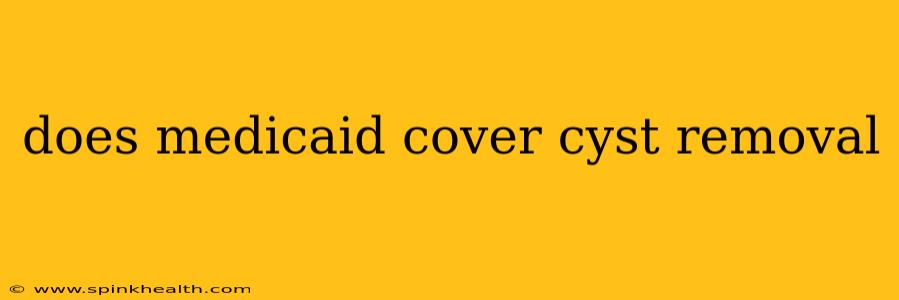Does Medicaid Cover Cyst Removal? Navigating the Healthcare Maze
The question, "Does Medicaid cover cyst removal?" is a common one, echoing the anxieties many face when confronted with unexpected medical expenses. The short answer is: it depends. Medicaid, a government-funded healthcare program, has variations from state to state, and coverage hinges on several crucial factors. Let's unravel the complexities and shed light on what you need to know.
Imagine this: Sarah, a single mother working two part-time jobs, discovers a painful cyst on her arm. The doctor recommends removal, but the cost is daunting. Sarah's relief is palpable when she learns she's eligible for Medicaid. Yet, the journey isn't always straightforward. Understanding Medicaid's coverage nuances is key.
What Factors Determine Medicaid Coverage for Cyst Removal?
Several aspects influence whether Medicaid will cover your cyst removal:
-
The Type of Cyst: Not all cysts are created equal. Some are harmless and require no treatment, while others can be painful, infected, or even cancerous. Medicaid is more likely to cover removal if the cyst is causing significant pain, discomfort, or poses a health risk. A simple, asymptomatic cyst might not be covered.
-
Medical Necessity: This is the cornerstone of Medicaid coverage. The necessity for removal must be clearly documented by a medical professional. Your doctor needs to justify the procedure, explaining why removal is medically necessary rather than merely cosmetic. A thorough explanation outlining the potential risks of leaving the cyst untreated will significantly improve your chances of approval.
-
Your State's Medicaid Plan: Each state administers its Medicaid program with slight variations in benefits and coverage. What's covered in California might not be covered in Texas. This is why contacting your state's Medicaid office directly is crucial. They can provide specifics on your state's plan and inform you of any necessary pre-authorization procedures.
-
The Provider: Medicaid typically works with a network of approved healthcare providers. Choosing a provider outside this network may result in reduced or no coverage. Always verify your doctor's participation in your state's Medicaid program before scheduling the procedure.
What if Medicaid Doesn't Cover the Entire Cost?
Even if Medicaid covers part of the procedure, you might still have out-of-pocket expenses. These could include:
- Co-pays: Some Medicaid plans require co-pays for medical services.
- Deductibles: You might need to meet an annual deductible before Medicaid begins covering costs.
- Co-insurance: You may be responsible for a percentage of the costs after your deductible is met.
Understanding your specific plan's details is paramount to managing your financial responsibility.
How Can I Find Out if My Cyst Removal is Covered?
The best approach is to contact your state's Medicaid office directly. They can provide detailed information about your specific plan, coverage, and any necessary steps to ensure pre-authorization before the procedure. They can also guide you through the process of appealing a denied claim.
Your doctor's office can also be a valuable resource. They can provide information on the likely coverage under your Medicaid plan and assist with pre-authorization requests.
Are there other options if Medicaid doesn't cover the cyst removal?
If Medicaid doesn't fully cover the cyst removal, explore other options:
- Payment Plans: Negotiate a payment plan with your doctor's office.
- Financial Assistance Programs: Many hospitals and clinics offer financial assistance programs for patients who struggle to afford medical expenses.
- Charitable Organizations: Some charitable organizations assist with medical bills for low-income individuals.
Navigating the healthcare system can be confusing, but remember, information is power. By understanding Medicaid's nuances and actively engaging with your state's Medicaid office and your doctor, you can increase your chances of securing the necessary coverage for your cyst removal. Remember, proactive communication is key to a successful outcome.

